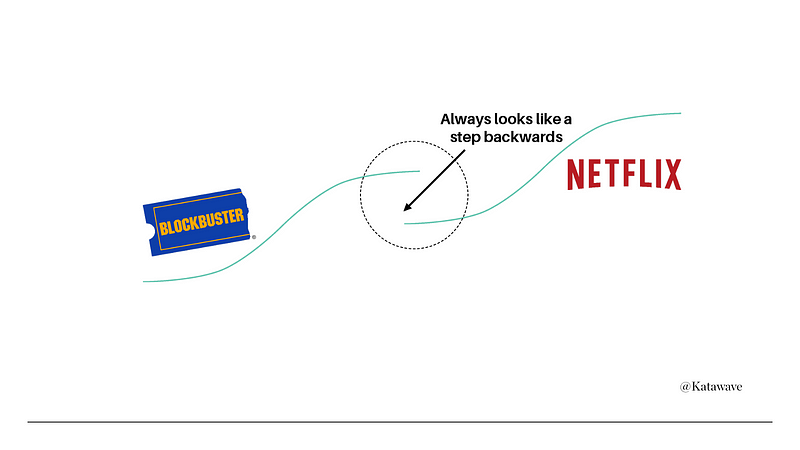
Fall down seven times, get up eight (七転び八起き) — Japanese Proverb
One of the first things rugby coaches teach young players is how to fall.
In rugby, players spend a lot of time falling. Coaches teach players how to fall at a young age to minimise injury. I always felt this was only half of the lesson.
When coaching, I drilled our players to get quicker at getting up off the ground than the opposition. That way we would always be one step ahead of them.
There is a much more profound lesson here. By accepting you are going to fall, you can focus on getting back up. After a while, this becomes second nature and we harness an invaluable life skill. This is the lesson and this is a lesson that can be harnessed for life and for business.
“And why do we fall, Bruce? So we can learn to pick ourselves up. “ — Batman’s Dad — The Dark Knight
Done is better than perfect — Sheryl Sandberg
https://media.giphy.com/media/6fi4vzobi0HJK/giphy.gif
In a community college pottery class, a ceramics teacher conducted an experiment. He split the class into two groups.
He tasked one group with creating the most pottery they could over the period of the course. This group would be graded on quantity and it didn’t matter how it turned out.
The second group was told they would be graded on the single best piece of pottery they could produce. If they nailed it and created an “A” level piece they could even take the rest of the class off.
In the end, he graded the students on technical quality and sophistication. To his surprise, the best pots actually came from the group focused on quantity, not quality.
Quantity over Quality?
Every time this group produced a pot, they identified how they would do the next version better. This group had fun, they enjoyed experimenting and trying new techniques. Most importantly, this group had no fear of failure, because no one was measuring them on perfection.
In contrast, the group measured on quality focused on optimising and planning and minimising mistakes. They were paralysed by the constraints of perfection. As a result, they created very few pots, but also very bland, “me-too” pots.
Innovation and change can only come gradually and by wholeheartedly embracing change. When we are freed from the fear of failure, great things can happen, the fear often stops people trying at all.
“You can’t fall if you don’t climb. But there’s no joy in living your whole life on the ground” ~ Unknown
In a Position to Fail
https://media.giphy.com/media/XPgCi2Aretkpa/giphy.gif
I’ve missed more than 9000 shots in my career. I’ve lost almost 300 games. 26 times I’ve been trusted to take the game-winning shot and missed. I’ve failed over and over and over again in my life. And that is why I succeed –Michael Jordan
You will see this trend in any sports team. When the coach introduces a new training drill, there is a natural reluctance to go first, to put oneself in the position of possible failure. But, if we don’t then how are we going to get any better? Is not better to have done it and continue to get better every time, then learn from our mistakes and work on them in our own time. That is how we get better, that is how we learned to walk, from falling.
Wayne Gretzky: “You miss 100% of the shots you don’t take”
Kentucky Fried Failures

Harland (Colonel) Sanders is the founder of KFC, Kentucky Fried Chicken.
- His father died when he was 5 years old when his mother was 7 months pregnant.
- Aged 5, he was in charge of the household, while his mother worked full-time in a factory.
- Soon afterward, Harland was forced to leave home to live with his uncle after his mother remarried and his stepdad beat Harland.
- When he himself married, his wife left him because he moved from job to job.
- His son died.
- Aged 40, he opened a service station and cooked southern chicken. He opened a restaurant as his reputation for great chicken grew.
- Aged 65, he had to sell his restaurant when an Interstate road was built bringing traffic away from his restaurant.
- He was ruined and turned to social security.
- He spent two years living in his car, while trying to find a restaurant who would buy the rights to his famous fried chicken recipe.
- He was rejected over 1,000 times.
- On his 1,010th attempt, he found a restaurant who licensed his recipe for 5 cents per chicken.
- Aged 74, his famous chicken was sold in 600 restaurants in the USA and Canada
- He sold Kentucky Fried Chicken for $2 million.
What resilience, what persistence, what an inspiration.
Failure is an Option here
“Failure is an option here. If things are not failing, you are not innovating enough” -Elon Musk
By embracing failing we will try more, we will take more shots on goal.
If we play it safe we will eventually die, the brain stagnates when we stop learning, the body loses its prowess. Businesses fail.
“Intellectual growth should commence at birth and cease only at death” — Einstein
We need to adopt a different approach to business and do so from within the business, not via startups and outside innovation hubs. Yes, we have to ensure we protect existing revenues, but we can experiment by prototyping and by accepting not everything will be a success.
If we were to optimise the business and invest those optimisation savings towards experimenting with new business models, that would pay dividends. Even if the dividends were the data on what did not work, a the very least that is one step closer to success.
The challenge has always been that the next jump always looks like a step backwards. No-one in the business is 100% sure if the next jump will work. Start-ups succeed because they cannot compete with established businesses, so they innovate with regulation, they innovate with business models, they innovate with mental models.

“You don’t learn to walk by following rules. You learn by doing, and by falling over.” — Richard Branson
In sales, we are rejected, in dating, we are rejected, in many aspects of life, we are rejected. When we embrace rejection, we embrace bouncing back. We also learn how to minimise rejection and build resilience. We learn to break off the wing mirrors and not look back.
“There is only one way to avoid criticism: do nothing, say nothing, and be nothing.” — Aristotle
No matter how hard we try to succeed, we will always fail. Many of us turn to our excuses, we point at others, we point at the organisations or we accept the status quo and just blend in. Leadership, entrepreneurship and success come with accepting owning and embracing failure.
We are trained to shift blame when we should accept when we get it wrong. The challenge with this in large corporations is that a scarcity mentality exists. Some think that by others failing it means that they grow in stature, even when they are not trying anything.
When we are big enough to accept responsibility for our mistakes we learn, we improve and we build resilience.
This post has been a quote fest, but this quote is from a great enabler of innovation, who truly overcame many falls:
“The heaviness of being successful was replaced by the lightness of being a beginner again, less sure about everything. It freed me to enter one of the most creative periods of my life. I’m pretty sure none of this would have happened if I hadn’t been fired from Apple. It was awful-tasting medicine, but I guess the patient needed it.” — Steve Jobs
I leave this Thursday Thought on this last quote:
Ever tried. Ever failed. No matter. Try Again. Fail again. Fail better. — Samuel Beckett
Thank you for reading, if you like this please click the Thumb so others will see it.
Episode 55 of the Innovation Show is called “Fail Fast, Fail Often
We discuss why we fear rejection, we care what others think, we fear failure.
What if we did not?
Imagine the possibilities, maybe we would be in a job we actually like, maybe we would have written a best-selling novel, maybe we would have written Harry Potter. What is worse, our education and often our parenting teaches kids to fear failure and to fear exploration. As we discuss on the show some kids are fearful of “going outside the lines” and this continues in life.
We learn how comedian Chris Rock uses a fail fast method to win over his audiences. We learn how to use a “happiness map” and we learn lessons from pottery class.
Ryan Babineaux is the author of ‘Fail Fast, Fail often’. He is CEO and founder of Happenstance Counseling http://www.happenstancecounseling.com/
Ryan is leading a Stanford research project that examines the work practices of masters in diverse fields — beer making, journalism, social entrepreneurship, engineering, long-distance running, mathematics, etc.He earned his M.Ed. in psychology and human development from Harvard University and his Ph.D. in educational psychology from Stanford University.
The show is broadcast on RTÉ Radio 1 extra 3 times weekly and is on iTunes, TuneIn Stitcher and Google play. The website is here and below is Soundcloud.